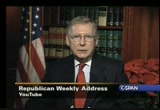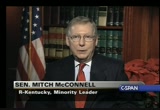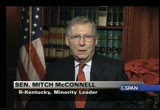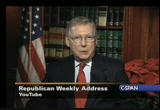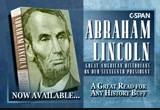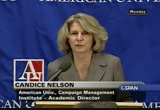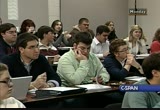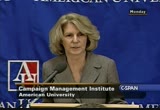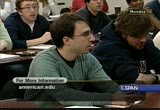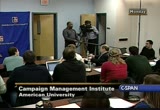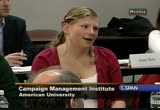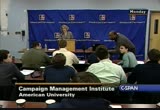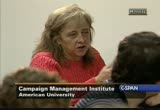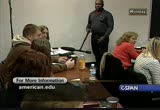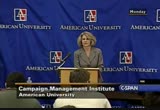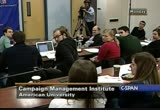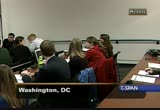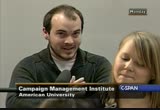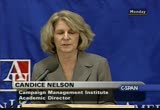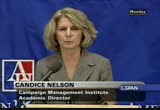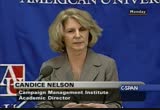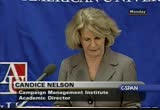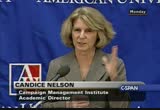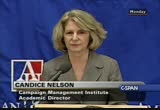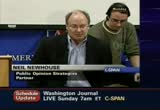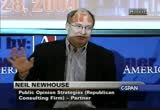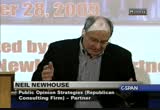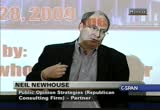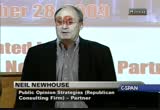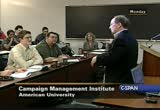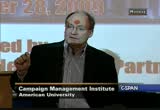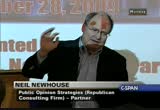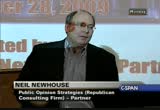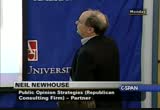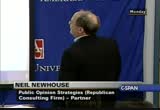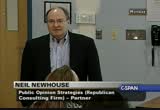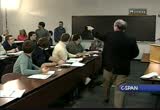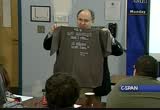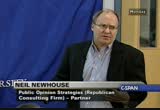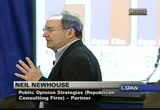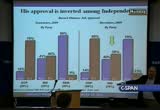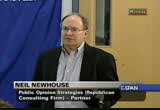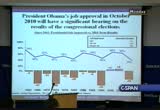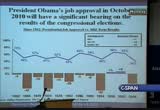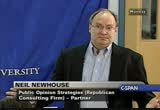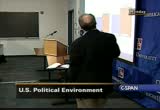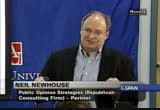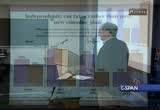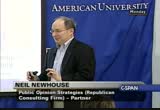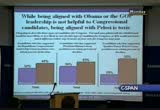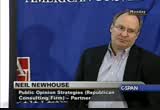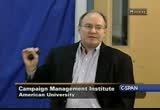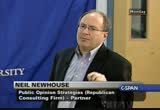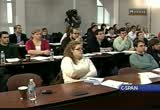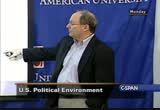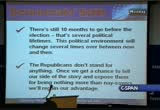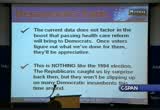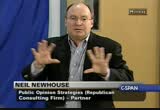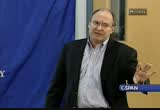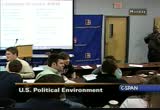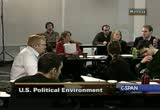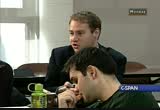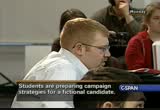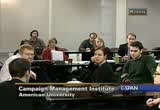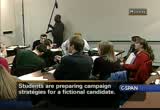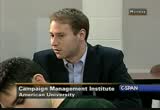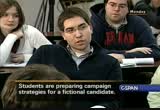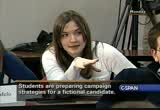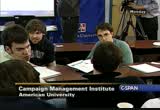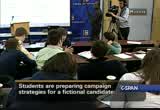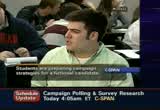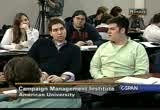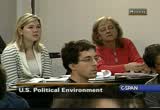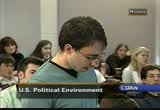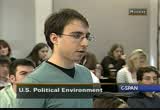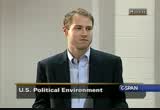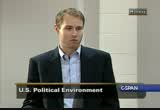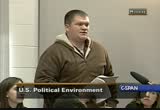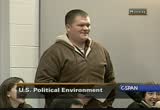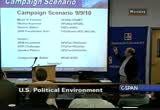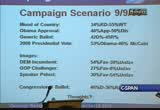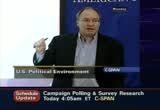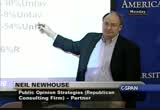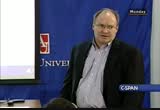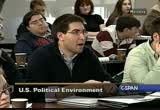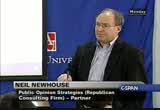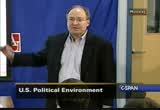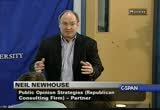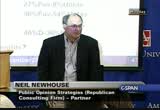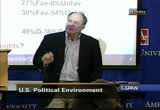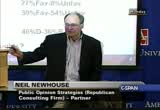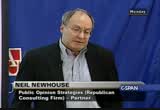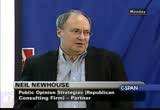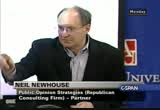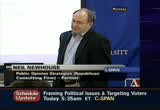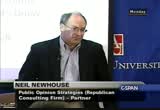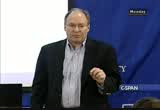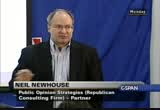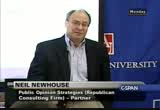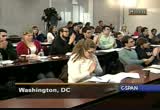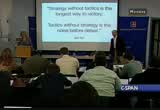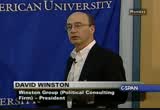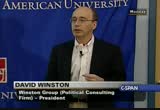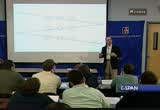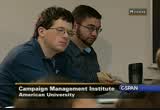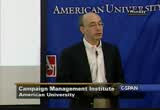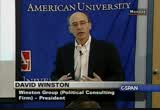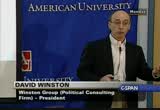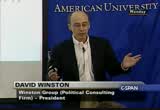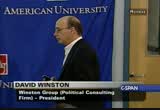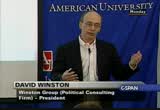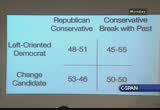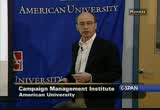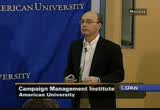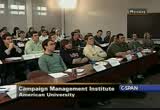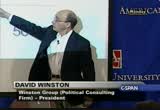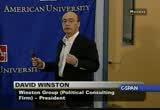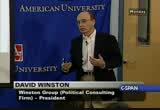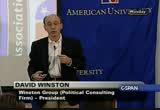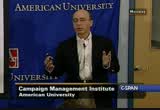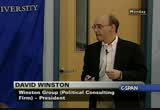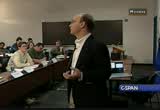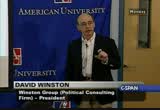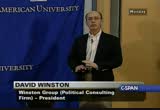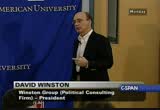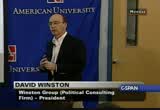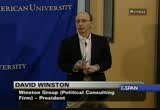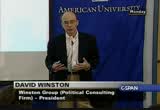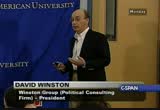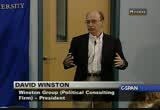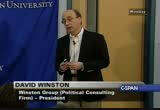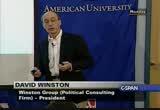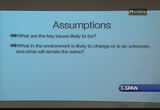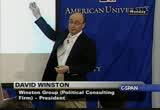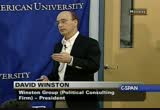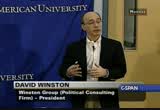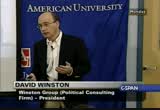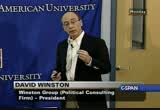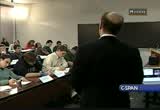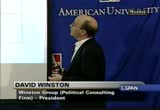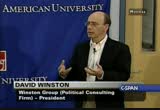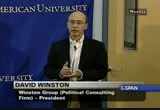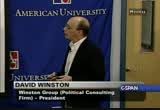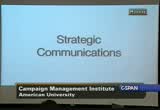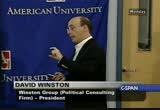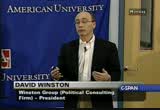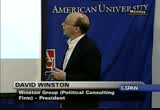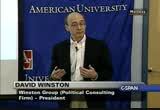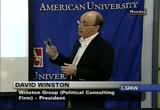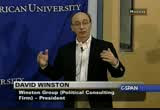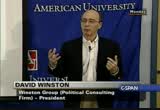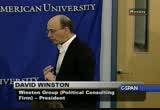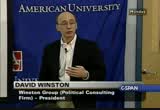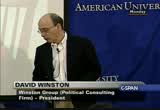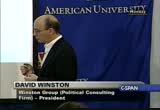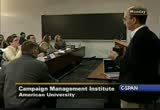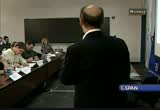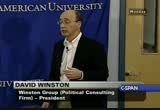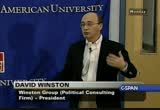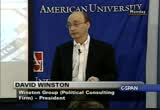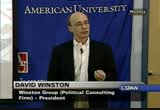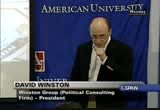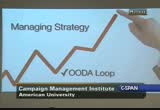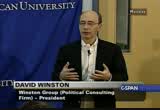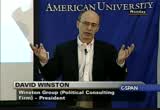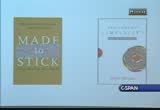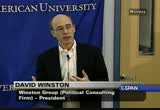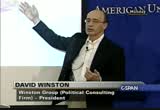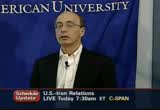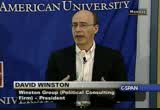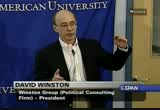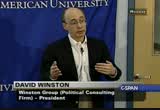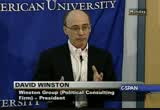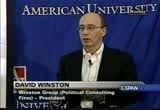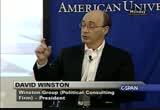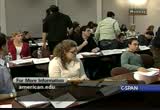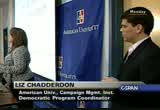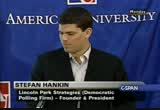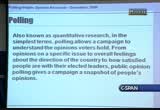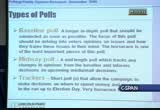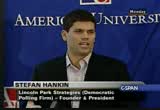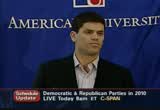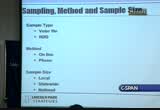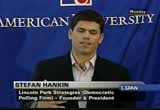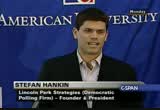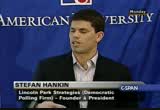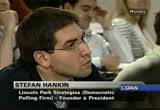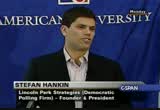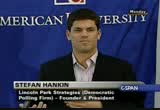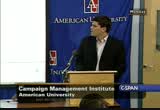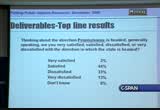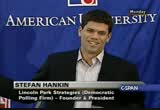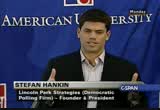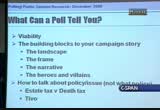tv C-SPAN Weekend CSPAN January 3, 2010 2:00am-6:00am EST
2:00 am
direction of george washington had just finished a daring but successful surprise attack on the british at trenton. in retaliation, the british launched an attack on the conflict of army. instead of retreating, washington ordered his troops to stay and fight. it was a daring move. when the soldiers in the continental army saw the size and strength of the enemy arrayed against it, many were filled with dread. but even in that awful moment, these men had a sense of their own strength, of confidence in one another, and a feeling that providence was with them that night. against impossible odds, these ragtag patriots broke the enemy column, forcing the british to retreat. at a moment of victory, the entire continental army triumphantly shouted as one. the second battle of trenton was a great victory for washington's troops and a great moral victory
2:01 am
2:02 am
>> some look a lot washington and wonder how lawmakers who always seem to disagree can ever solve any of our problems. while it is true that many of us approach the issues differently. at the beginning of a new year, it is important to remember that we are all united by our love of country and by a common faith that no challenge is too great. political disagreements will continue in the year ahead. that is important to any vibrant democracy. but americans expect and deserve their elected leaders to put country first and work together to solve common problems. powerful forces may be aligned against us, just as they were against the cons nenl army on that cold night. but when things are tough, americans always join ranks.
2:03 am
it was true in trenton and no less true today. thank you and happy new year. >> tomorrow, on "washington journal," an economics proffer looks at how america deals with iran. and darrell erickson, author of "cuba wars" looks at u.s.-cuba relations. "washington journal," 7:00 live on c-span. >> this week on the communors, rod talks about his nonprofit group and its efforts to zpand do main names. the communicators, monday at 8:00 p.m. eastern on c-span 2. >> now available, c-span's book, "abraham lincoln, great american historians on
2:04 am
america's 16th president." it is a unique contemporary perspective on lincoln from 16 scholars and writers. from his early years to his life in the white house and his relevance today. at your favorite book seller and now in digital audio to listen to any time. learn more at c-span.org/lincolnbook. >> and now a look ahead to 2010's key senate races from american universities' annual campaign manage institute. also, remarks from the former lead pollster from barack obama's democratic campaign. this is 3:35.
2:05 am
>> our teaching assistant is chris, who is running in and out of here. you have been in communication with him by e-mail. he took this class. sew has sat in your seats i think a year ago. liz, do you want to say a little about yourself and then we will have the students introduce themselves. >> does anyone not have a syllabus. all right. my name is liz. i guess i am the democratic program director. carol whitney, who will be here later is my republican counterpart. so we are always bipartisan. i own my own democratic direct mail four which has been in place three years. prior to that i did direct mail. i am originally from houston, texas, proud graduate from the university of texas at austin. glad to see you. this is the biggest group i have been involved with.
2:06 am
so this is going to be a fun one. >> this is the 27th year it has been offered. it is a bipartisan training program. it was started by a graduate of a.u., bill sweeney, and wilma gold steen who was doing training, and they said it would be interesting to do this. they came to the president for congressional studies here, and jim said that was a great idea, and we have been going ever since. a number of the people who have been through this program are now principals in their own firms. one of kneel's partners is now at a leading republican survey search form. let's go around and introduce yourself. tell us your name, where you are from, where you are taking the class, any campaign experience you have had and
2:07 am
whether you are a d, r 0 or i. let's start here. >> i am a senior from delaware. i have always had a strong interest in campaigns and heard nothing but great things from c.m.i. i worked on a few campaigns in 2006 and helped out in 2008 for mccain. >> thank you. i am brook keeper. i am a senior from ohio. i have no campaign experience, but i hope to change that and hope to get a paid job. i am here representing the r's as well. >> i am dave. i lived in tennessee for years. i canvassed for the obama campaign once. there is my experience. i am a d when it is convenient and heard this was a great class and so decided to take
2:08 am
it. >> i am ryan from east brunswick, new jersey. i heard it was a great experience and looking forward to taking four classes in the spring as opposed to five. i am a democrat and interned for rush holt and bob mendez in new jersey. >> anytime michelle from new york. i am a second term graduate student. i have been on a number of campaigns in the past and a bunch of local races in new york. i figured this would be helpful to boost my strategies. glad to be here. >> d or r? >> d. >> always obvious. >> kneel, newhouse, and i will be the first speaker today. >> my name is joe.
2:09 am
i am a senior from brooklyn, new york. i am a democrat. no campaign experience. i have heard nothing but good things about c.m.i. >> tim murphy. i am from massachusetts, a senior at a.u. i have very little campaign experience, mostly volunteering for small local stuff. i heard the class is great deal. i am a d. >> whereabouts? >> in wheaton. >> i am martha, and i am a senior at a.u. i am a democrat from buffalo, new york. i interneded -- interned at a firm and they suggested i get some experience. >> i worked on the warner campaign in virginia. >> i am jackie. i am from morris, minnesota.
2:10 am
i am a democrat. i don't have a lot of campaign experience, just a little volunteer. but i have heard great things about this class. >> i am very vienna, austria, and i am a grad student over at s.o.c., focusing on political communications. that is why i am here, and i am a d in american terms. >> i am derrick. i am a graduate student in the public policy program, and the last campaign i worked on was romney for president. i am taking this class because i hope to make a career out of it. >> my name is michael. i am a senior here at a.a.u. i am a democrat, and my campaign experience has started from 15 up to a precinct captain in iowa. i am taking this class to round out my complete a.u. political education.
2:11 am
>> i am joe, from a small town in up state new york. i am a democrat. i have interned from a small consulting firm who raised money for jim webb and chuck schumer. i have heard it is a good experience and a great class. >> my name is jonathan baker. i am from outside of boston, massachusetts. >> whereabouts? >> need a.m. -- needham. i don't have any experience, which is why i am taking this class. i, like everyone else, have heard great things. >> i am from massachusetts. ry -- >> my name is rod. i am a junior at a.u. right now i am working at a consulting firm called catalyst. but in terms of hands-on political experience, i have done a bunch of field work for
2:12 am
obama for america and i am working on a campaign from catalyst. >> my name is ron from massachusetts. i am a democrat. i guess i volunteered for the obama campaign through the afl-cio, and i have had a congressional sbrnship. i am taking this place because i enjoyed your last class, campaign elections, and i am hoping to get some practical experience for when i graduate. >> i amored. i am from southern california. i am a democrat and i am taking this class because i heard it was a great experience. >> my name is caroline. i am a second year master student. i am from martinsburg, west virginia. i have some volunteer experience, state and local elections. i am a d, and i'm taking this
2:13 am
class because i have heard good things about you and i need to try to graduate. >> honesty at last. >> i am maggie. i am a second year masters stuned. i am from virginia, also a d. i have taken the other two, so i am rounding out the third. >> great. >> my name is jared. i am from long island, new york, a democrat. i interned in then senator quenton's office last year and did some field work from the obama campaign. i have heard nothing but good things, so i stopped by. >> my name is gretchen. i am a first year applied politics student from st. paul minnesota. i worked with a campaign to replace rob ee mental in minnesota's fifth district. >> i am cries. i am from virginia.
2:14 am
i am a first year grad student. i have worked for mcdonald for governor, and then huckabee and john mccain for president last year and i am a republican. >> i am stephanie slayed. i am a first year grad student from tampa, florida. no tam pain experience. i would consider myself an open-minded r. i am here from a interest in plig communications. >> no campaign experience. i consider myself a leaning democrat. i took c.m.i. because of its reputation. >> my name is dan. i am from san francisco. i am a first year masters student. i am a democrat and i am here for c.m.i.'s reputation. >> ok. >> my name is ad. i am a senior at american university. i originally hail from
2:15 am
princeton, new jersey, although i live in alexandria, virginia right now. as far as political and campaign experience, i have taken everything a.u. as offered. the most recent one was rob eveningal he is class, and he instructured me to take this class if i wanted to live. i currently work for an organization called u.p.t. strategies out of new jersey for whom i do campaign writing. >> i am colin. i am from massachusetts. i am a republican. not a lot of campaign experience. i took election voting behavioral a while back and i am interested in this one. >> i am melissa from iowa.
2:16 am
i am a first year graduate student. i am taking this course for interpretation. it was very interesting to me, and i interned on the kerry for president campaign in iowa as assistant to the volunteer coordinator. >> i am and r. i am from florida. and this sounds very fun. >> my name is chase meyer. i am from temple, texas, a democrat. i have worked on congressional election in my home state and volunteered on the obama campaign, and i am taking this class because i have heard great things about it. >> my name is alison. i am from portland, oregon. i don't have any campaign experience, but i am hoping this class will help me change that, and i am a democrat. >> i am indicatelapped from
2:17 am
indiana. i am a senior at a.u. in the political science department. i have been wanting to take this class since i was a freshman. i worked on the obama campaign from the primary through the general election, and i am hoping to get more experience. >> i am dawn. i am a senior here at a.u. i am ornlally from cincinnati, ohio. i have interned at both the democratic national committee and the ohio democratic party. i am taking this class because i am very interested in in possibly working on campaigns after graduation. >> all right. >> i am a senior here at a.u., a democrat from richmond, virginia. as far as campaign experience, i have volunteered a handful of times for the ill-fated judy
2:18 am
campaign and another campaign this past election cycle. >> did we get everybody? great. welcome. we are going to spend a very interesting about weeks ago. i think you'll learn a lot during the course of the next two weeks. the course is set up, we will work in groups. you will write campaign plans for real candidates who are running in 2010. for this session we are going to do senate races in ohio, missouri and pennsylvania. bob will be in to talk about senate races, and at the end of the day we will let you put yourselves into groups and pick the candidates you want to work for. this course is taught over two weeks to try and simulate a campaign. those who work on campaigns know it is not something you do twice a week for 1:15. at the end of that, i will predict that you will know more
2:19 am
about these races than the actual candidates who are running in the races in the fall. as i said, it is a bipartisan class. we will have equal numbers of democrats and republicans speaking. it may not seem that way from day-to-day. today there are more r's than d's speaking, but it will balance out. so get used to it. the speakers are both good at what they do and teaching what they do. that's important. some of what you will be taught you will need to write in your campaign plans. other things like talking about voter files, that we will talk about tomorrow, you're not going to have to do a voter file for your campaign plan, but it is information you need to know so if you go out and work on a real campaign, you can understand what should be done. everyone has a copy of the syllabus. all of our contact information is on there. it is important if you have questions to get in touch with us. for example, if something comes up on saturday night, and we
2:20 am
are not going to have a class on sunday, don't wait until monday morning. e-mail us, and we will get back to you pretty quickly. carol and i are more morning people, and liz it an evening person, but we have it pretty kell covered 24/7. but time here, as in a campaign is your enemy. so you you want to take advantage. the course will progress pretty much the way a campaign would progress. neil is going to talk first hand about the political environment going into 2010. bob will be in to talk about senate races. david will be in this afternoon to talk about strategy and message. and then we will round out the day by talking about survey research. and then tomorrow we will continue talking about research and how to use issues to frame a message. then tomorrow afternoon we will talk about targeting and voter files. those are really the building blocks of any campaign.
2:21 am
what is a political environment, how do you develop a strategy, who are you going to talk to? then we will get into more of the tactics. we will talk about budgeting on wednesday, management and organization. we will spend a good part of wednesday talking about money, and into thursday you're going to get out of here on noon on new year's eve, which is pretty early, actually. >> that was nice of you. >> that was nice of us. there is no class on new year's day. that is not to say you won't be thinking about it. and then on saturday we will do pretty much media. you will have sunday off. monday we will talk about managing the candidates. ann, who will be in to talk about that, is a graduate of c.m.i., and she has gone on to do amazing things in a short period of time. absentee and early voting on monday. we will get into volunteers and fields as we get into next
2:22 am
week. a little bit more on fundraising, and then we will wrong up on thursday. we have a former congresswoman from maryland will be in to talk about what it is like to be a candidate. so that is sort of how the course will proceed. there may be changes in the syllabus as we go along. if there are changes, we will let you know as soon as we know. and if there are changes at the end of the course, you will get an updated syllabus so you will have an accurate reflection of who spoke. let me talk about some of the expectations. be prompt to class. the speakers are here. neil is here ready to speak. so be prompt. if c-span is here and you're late, they will watch you come in, because that is what they like to do. you know your parents who are watching will say colin is not there. where is he? oh, here he comes. class tepid ands is mandatory
2:23 am
unless there is some reason you need to be excused. if you do need to be excused, speak to us, and make sure chris knows. chris is the keeper of class attendance. everything is off the record except when c-span is here. one of the reasons our speakers are willing to come back because they know what they say will stay in the room because this they know it won't be shared with friend, people on the hill or anyone else. if you are working on a campaign, be honest with them. don't be sneaky and try and talk to the other campaign. if you need information about the institute, speak to chris, and we can e-mail them information about it. take notes on everything. not just on your part of the plan. there is a tendency particularly in the second week to get tunnel vision. there's a good chance that when
2:24 am
you graduate, you may not be doing paid media right away. if any of you have read anything about the 2008 election, most of the people that were higher up on the obama campaign started out doing fields. many of them started out doing field in iowa, which is why they did so well, because they knew the state. so tack notes on everything. laptops need to be closed during presentations. all over electronic devices. i just got off a plane last night, so i am used to this language. need to be turned off. no tweeting, no e-mail, no black bears, nothing. if you are doing it. we will know, and c-span will know. if you want to look at past campaign plans, you can check them out for the next couple of days. see chris. you won't know if they are good or bad. you will have a sense of what they look like. some of the things. the answer to almost every
2:25 am
question is going to be it depends. just get uses to it. if we teach you well, on presentation day, a week from sunday, that will be your answer back to us sometimes. the second thing you need to understand is you are not normal. most college students are not spending two weeks starting three days after christmas in a classroom talking about campaigns. and that is important because when you go out in the real world, you need to understand that most people are not thinking about who is going to run in 2012 for president on the republican side. we are all obsessed with that. will it be huckabee, or palin? you're different, and that is good for all of us, but you have to understand that when dealing with real people. the third thing, if it is not in writing, it doesn't exist. so you need to write stuff down. there have been too many examples of campaigns, even at
2:26 am
the presidential level, when something happens to a key operative and he or she had a big part of the campaign plan in his or her head and people were trying to figure out exactly what was going on. it is important, as you -- excuse me. as you start getting information for your campaign plan, put it in writing. figure out how you're going to make that information available to your group. so in you're doing the budget, that is not a secret from the rest of the campaign. everybody needs to know. sum is not a number, soon is not a time. how many people are we going to have canvassing on saturday? a lot. no. we need a number. so keep that in mind. sorry. >> and finally we need to know how many days there are to
2:27 am
election day. the three things in a campaign are people, time and money. time is the one thing you can't get more of. so you need to understand how many days to election day and work backwards. any questions at the moment that you have of us or for us? chris, you had something? come up here. >> good morning. i am chris. i am the assistant director here at c.m.i. just like she said, you are more than welcome to contact me with any questions you have. e-mail or call my cell phone. i just found out this morning that my desk phone isn't working, and i am not there anywhere. in fairness, i should let you know i am a democrat. most of my volunteer stuff is on line, contributing to blogs and stuff like that.
2:28 am
i am originally from pennsylvania and i spent a lot of years in the newspaper business before coming back to grad school. i know pennsylvania very well. if you are ever doing pennsylvania races, you might want to become good friends with me. when you are doing your campaign plans, we will go over this later, but one of the things you will have to do is have it printed up. i have made some arrangements that will cut your printing costs at least in half from what i had to experience. this is my third time going through this, so i have done this before. you are welcome to give me a call with my questions you might have. the only other thing i have is i will be passing out cards. i need you to put your name, address and cell phone number. the reason i need this, i won't be sharing with anybody. but when you get done with this, you get a nice little certificate. i need to know where to send it. i will be passing these out. >> as we are working through
2:29 am
the campaign plans, as you are writing them. feel free to share them with us. this is not a turn it in at the end kind of thing. this is much more interactive. if you are wondering whether you are putting in enough or not enough, share that with us at breaks. liz, any other things we should mention? ok. questions? there will be some. our first speaker at the campaign management institute at american university is neil new haas. he is a member everyone of the premier republican research companies in the country. he worked on the mccain campaign. they have worked not only at the presidential level, but
2:30 am
senate, congressional, gubernatorial, at every level. as i said, it is one of the really outstanding survey research firms. we are thrilled that neil is willing to come in first thing and speak to us. so i am going to turn it over to neil. thank you. >> i would appreciate if you hold your applause until later. >> one other thing. if you have questions, wait for the boom so people can hear them. >> chris, i have a remote system. >> let me give you a bit of background about where i came from, because it is very similar to you guys. i heard a couple of people here taking a voting behavior course in college. that is what got me started. i went to duke university and graduated a long time ago.
2:31 am
what really got me -- i was from cast. i was never interested in pliment. i took a sociology course and then a voter behavior course in 1972, and that really whetted my appetite. then in 1972 in the fall, we had two pollsters come to duke to speak about what they do for a living. it was pat and peter. i know. i was like -- this was fascinating. it was cool stuff. i am a frustrated high school athlete. i loved the competition. the reason i was kind of drawn to this is because of the competitive nature of politics. so i kept taking courses, and then went to u.v.a. for grad school and then kind of migrated to washington. i had never been to d.c. before in my life, before i came here to work or trying to find work. i ended up as an intern in
2:32 am
survey research in the republican national committee. i worked the phones 40 hours a week and then worked 20 hours more. so the internship was 40 hours a week and worked the phones 20 hours a week raising money in 1974 or so, which was immediately after watergate. it was a little tough. and then my internship, my intern coordinator, and his name was a guy named karl rove. so it was an interesting experience. i then decided i wanted to go work on a congressional campaign. so i finished my grad school stuff and went through a seven-day intensive 18-hour day campaign management college put on by the republican national committee. they teach you everything you need to know about running a campaign. the only thing i had done at duke in terms of politics was
2:33 am
handed out buttons for george mcgovern. i was a college kid in the 1970's, everybody was democrats. that was the only thing i had ever done. lo and behold, i was wandering through the nrcc and talking to a guy who said you did really well at the campaign college. i've got a candidate in new jersey who needs a campaign manager. i was like great, i have been to new jersey before. [laughter] >> it was on the way to new york city. i went up and interviewed for the job and it turns out one of the guys in my class was doing a neighboring campaign. he called. he had his candidate call up my candidate and give me a glowing recommendation. and then my candidate called my buddy and said well, how much money do you make. my buddy lied and increased it $100 a week, so i got $350 a week instead of $250 a week.
2:34 am
this was great. i was in this campaign. it was june of 1976, and our entire budget in the campaign was 100,000. but we had some things going forward and some things against us. my candidate didn't live in the district. no big deal. he didn't work in the district. but those are minor details, guys. his opponent, the six-term democrat incouple benlt, a member of the house ways and means candidate had been my candidate's seventh great english teacher. it is easier for you to think about to seventh great and your english teacher. for me it was ms. walker. that was the last person i ever wanted to debate. he refused to debate the incumbent. my candidate refused, so i
2:35 am
debated him. i was 23 years old. i was taller. i had more hair. i did he patrioted the incumbent congressman three times. the first time was before associated builders and contractors. i thought i was pretty good. i went into my regular spiel and i did pretty well. the next time was before a junior high school. it was a junior high school that had a lower balcony and upper balcony and it was packed. i was standing at the podium, and the incumbent was standing back. there was a photographer over here. i am standing here and there is a picture of me standing here and the congressman looking at me like he could kill me. it was time we had a congressman we could be proud of, he has missed 169 straight votes in the house, and i went on and on.
2:36 am
i am thinking this is great stuff. i should run for office some day. forget the candidate. it is about me. the final debate was in englewood, new jersey. i figure this is going to be a snap for me and i go into my usual thing. some woman raised her hand and said aren't you in effect a surrogate for your candidate? your candidate is not here. what makes him different from the incumbent who missed 169 straight votes? well, my debating career went downhill in a hurry. it was so bad that the congressman who just hated me put his arm around me and told me that's all right, son. so that was my debating career. i figured after that no more. election day came. we went to mcdonalds down the street for dinner. i sent everybody out -- and everybody was six people, so the respective key precincts
2:37 am
just to get the information back in. so when the polls closed on election day in inglewood, new jersey, i was alone in the campaign headquarters with a woman college radio reporter, who was there with her mother because her mother wouldn't let her come alone. just the three of us in. came pain headquarters. numbers started coming in. and you know what? it looked pretty good. i had done all the targeting stuff. i knew where we had to be. jimmy carter is winning the presidency. i was doing pretty well. i called my mom back in kansas city and tell her. it cols back more. i am like oh, my gosh. it is really getting good. then they declared us the winner with 54% of the vote. it was a stunning -- i mean the newspaper described our
2:38 am
headquarters in stunned disbelief that we had run the race, which was absolutely true. i have got my green dodge consult, my kansas license stag , and within two days i am coming back down to d.c. to celebrate with all my friends. we go in the capitol hill club. there are only 20 republican freshmen that year. only a handful beat democrats. my buddy who helped me get the job. nbc news had to declare his guy the winner and then they retracted it and he lost. so we go to the most logical place you go to when you win. which is the capitol hill club. my head is so big from winning this campaign, i had to go in like this. everybody is congratulating me. in the end, i was explaining how we beat the fair campaign
2:39 am
practices. we put the tabloid out and i debated. it was great stuff. then some guy, a buddy, says neil, don't you think that the fact that the incumbent had been indicted had something to do with the victory? it was just the ignorance of that people. new jersey indictments were for you, not against you, right? [laughter] >> truthfully the incumbent had been indicted on 10 counts of bribery, percentage and obstruction of justice. it was 10 days before the primary. they did a recount and they found 1,100 absentee ballots in the same hand writing. they reran the democratic primary from june to september 28. best we could do was call for the best two out of three. we ended up winning. my guy won the race, came down to washington. i became his chief of staff at
2:40 am
24 years old or something like that. i was horrible, just horrible. you know what? i was really good at campaigns. i was terrible at administration. so when they started talking about all the detailed stuff that you go through before you get to there, the media stuff, that is something you pay attention to in a campaign. so i decided campaigns were for me, and i kept working for the republican national party and other organizations. i worked for dirk's company who did ronald reagan's polling. i have worked offering from city council race ns cincinnati, ohio, to ukraine to the first democratic polls in south africa. i have done work all over the world. i have worked in every state but won. i have not worked in wyoming yet. this experience you are going to go through is incredible. this is how i got started. this is how my partner, glen,
2:41 am
got started. it is really terrific that all of you are here. i wish there were more republicans, but i can understand. the first thing i want to do here is give you a little quiz. everybody take out a piece of paper and pencil. you are going to be graded on this by me. doesn't count on your real grade. just to see how you do. thank you. so a national political environment quiz. the first question is what percent of americans own an i-pod or other type of mp-3 player. this is a telephone survey. what is the number? everybody put down your answer. i am going to call on people. what number? >> 20-29. >> 50 plus.
2:42 am
>> 40 to 49. >> 40 to 49. >> ok. the actual answer is 47% of americans own an i-pod or other type of mp 3 player. three years ago it was 13%. give yourself a point if you got that one. next, what percent of likely voters in california think marijuana should be legalized to help solve california's fiscal problems? anybody here from california? ok. what is your answer? what do you think? >> i am going to say 40 to 49%. >> fiscal problems that bad there? >> yes. >> who else? other guesses? >> 50% to 59%. >> 40% to 49%. >> yes? >> 50% blue. >> young lady? >> i said 30% to 39%.
2:43 am
>> different survey. what% of adult americans say they have actually tried marijuana. what percent of adult americans say they have tried marijuana? >> i would say like 80%. >> oh, my god. >> i think so. >> all right. indianapolis, what where are you? what percent of adult americans say they have trade marijuana? >> actually admit they have trade. >> exactly right. [laughter] >> on a telephone survey to an unnamed question. >> i would say it is less than 50% will admit. >> how about you? >> i would say about 40%. >> one third of americans will admit on a telephone call that they have tried marijuana. >> you are right. the budget problems in california are so serious that 54% of california voters say that marijuana should be legalized to help solve california's problems. i'm not sure if that says more about marijuana on the budget
2:44 am
problems. [laughter] third, what percent of adult americans with home computers would rather give up their tv than their computer, would give up their tv than their computer? if you had to give up one of them, what percent are going to give up tv rather than computer? who haven't i picked on? >> 30% to 39%. >> you? >> 30% to 39%. >> 40% to 49%. >> 60%. >> 60-plus. >> 30% to 39%. >> the right answer here is 56% of americans with home computers would rather give up their tvs than their computers. backing up from that for a second, think what that means for political campaigns down the road. think what that means about how to communicate to people and reach out to people if you can't reach them by tv as well any more?
2:45 am
question four, what% of americans say they have a gun in their homes? again, we will admit to a stranger on the phone they have a gun in their homes? >> what%? the answer is? >> 20%. >> how many people say he is right? well, he is not. ok. what mrs? >> 40% to 49%. >> you in back? >> 30% to 39%. >> who here is from the rural midwest? young lady? >> i would say 30% to 39%. >> actually, 44%. twice, the n.r.a.'s image in this country is better than the republican party or the democratic party. come on now. and the final question is what percent of americans say that a u.f.o. crashed in roswell, new
2:46 am
mexico in 194. this is probably before most of you were born. what percent of adult americans. who wants to venture a guess. yes? >> hopefully under 20%. >> is he right? no. what else? >> 40% to 49%. >> who hears from like far west? >> where are you from? >> california. >> all right, the answer here is 65%. >> wow. >> 65%. the government is keeping this a secret. come on now. this gives you a little taste of public opinion, and it may be a little different from what you imagined. how many people got all five right? ok. four. three? ok. stand up. you face got three right.
2:47 am
i know your republicans. stay standing up. we have a prize for the one who got the most right. we have to do a question-off here. let's see, what percent of americans consider themselves evangelical christians? pick a number. >> a range or a number? >> a number. >> 55%. >> 47%. >> 47%. >> 32%. >> 24%. >> this guy gets it. the correct number is 42% of americans consider themselves evangelical christians. there is a prize for you. you are a democrat unfortunately, right? i know. public opinion strategies t-shirt. but the most important is what is on the back. it is not enough that i win.
2:48 am
all others must lose. you weren't weren't away this, but this is a quote from atilla the hundred -- the hun. now let's go to the actual numbers. the national political environment, what is going on in the country. the first question we ask in all our surveys is do you think things are generally headed in the right direction or have they gotten off track? not surprisingly, this is called the right direction, wrong track question. when americans think things are going well, they re-elect incumbents, if things are going poorly, they kick them out of office. simple as them. guys, i have done polling in bulgaria and we have had better numbers than 2008. there is an incredibleably negative political environment, much more negative than it was in twikes. in 2006 it was 31% to 54%.
2:49 am
this was 12% to 58%. this was a change electorate. status votes didn't cut it. voters became much more optimistic after obama took office. what is something is everything flipped. republicans who were more optimistic before obama got in became pessimistic. democrats bake optimistic. what has happened, the numbers have gotten lighter again, 33-55. similar to 2006. the mood in the country has slipped back to where it was in the 2006 election as the major changes that people were hoping would take place really haven't. so the mood in the country is negative as it was in 2006, not as negative as it was in 2008. it is key to understand how that impacts the political
2:50 am
environment, how it impacts races across the country. do you feel confident or not confident that life for our children's generation will be better than for us? >> 28% says yes, and 68% says it won't be. there is a real concern about the future for our children being not as good as for ourselves. that pessimism is underlying american attitudes right now. >> people that are into the environment thing or the economic thing, what do you think? >> that is a good question. we don't really espy's fly on that. right now everything is being driven more by the economy than anything else. i would have to think in the current political environment that would be more economic just because of the situation the country is in. obama's approval rating, february, 60-26.
2:51 am
the april numbers -- this is nbc news/"wall street journal" poll. i borrow a lot from their polling. 61-30. then you look at the far right hand side. the most current data, 47-46, dead even. what is most interesting is the intensity, and you need to pay attention to this for your own individual races. 25% strongly approve, 34% strongly disapprove. what does that tell you? anybody? >> really polarized. people feel really strongly in either direction? >> no. if there is intensity, where is the intensity? on the anti-, side. the intensity is moving against the president. that 25% strong approval, you
2:52 am
know where that was here? that was at 42%. the intensity of his approval rating has fallen by half. the intensity of his disapproval has gone up. the energy, as you saw in virginia and new jersey, the energy is now anti-obama, is on the republican side. everybody see that? on the leffeds, september obama's approval rating among republicans, 16-76. among democrats, 80-69. now his approval amongst is 58-40. these voters are the key to winning elections. we have 40% of the sample being democrats, 48% being republicans. the country is still tilted democrats, bus these independents are key to winning
2:53 am
elections. that is how you win elections in this country, by appealing to the middle. [inaudible] >> in this poll they do include leaners. what is interesting is republicans in the past, in the last election, the mccain election, there was a real sovereigning of the republican base because of the george w. bush years and his unpopularity. so republicans lost support. those voters went to independents, and soft independents went to democrats. so you had a three-way cut. some of the data we had showed democrats with as much as a 10-12 point lead in terms of part shanship, which is an encredible lead for a republican to overvom. americans are no longer confident obama has the right set of goals and policies to be
2:54 am
. . whether you agree or disagree with the way the question is worded is really not -- very well rant. the question is, how confident are you that barack obama has the right set of goals and policies to be president of the united states? extremely, somewhat, not at all confident? he has gone from december before he took office, 54-45, plus nine, to now minus 22. wow. that is a huge difference. and you see it has been a gradual follow-off since july. so there are growing doubts about obama which are reflected not just in his approval rating, but in a question like this. here is why this is important for the 2010 elections.
2:55 am
dating back to even before when i was involved in politics, 1962, what we did is we tracked here the president's job approval rating in midterm elections and then correlated that with the gain or loss in the house of the president's party. so that the box on the right-hand side, when the president's job approval rating is 60-plus, his party generally has a pick up of several shonts. if it is 41, average loss of 41 seats. so what does that tell you about 2010? those who are independent or leaning one way or another, it would be a good time to run a republican campaign, wouldn't it? i mean it is really very interesting data.
2:56 am
to give you an example, i lived through the 198 campaign. i was very involved in that campaign. the republicans lost 26 seats in the house. we actually lost 26 republican incumbents. each of those incumbents outspent their challengers by $150,000 a race, which at that time was a heck of a lot of money. you know what difference it made? not. we outspent them and still got beat. only one republican challenger in 1982. any idea who that might be? john cassics, now candidate for governor in ohio. the presidential job approval is going to play a huge role in 2010. people still don't like the
2:57 am
republican party. the image of the republican party still hasn't changed. 23% positive. 43% negative. it has been anywhere from minus 21 to minus 13. it hasn't changed a bit. what has changed, though, is the image of the democratic party. from in february, plus 18, positive/negative 49-31 to minus 10 now, 45-35. it is really as a result of the health care debate. the image of the democratic party is now more negative than all year long. the republicans haven't moved. it is voters souring on the democratic party, which ought to give democrats hope that you know what? we did it to ourselves. we can turn it around. it is the highest negative rating the democratic party has
2:58 am
received in the polls since the question was first asked in 1990. wow. you know what other candidates you have to look out in 2010 0 are the tea party candidates. this is the perfect political environment for a third party to be formed and do well. it remind me of the 1992 ross perot campaign. this is going to be representative after a while, but 25 in february. those are too optimistic, it now minus nine. 42-51. a majority of americans now disapprove of the job obama is doing as president. for you democrats in the room, i'm not trying to depress you. i am not trying to do that on purpose. it does feel good, but i am not trying to do that. for the last two elections as a republican pollsters, i have
2:59 am
been by far the most at leasting guy in the room. cocktail parties are not fun. but you need to understand how the political environment affects your political campaign. it changes what you're going to do. you're not going to run the same campaign you ran in 2008. i promise you are not going to do that. if you do, you lose. i am going to read you two statements about the role of government. government should do more to solve problems and help meet the needs of people. or government is doing too many things better left to businesses and individuals. in february, they voters said government should do more to solve problems of people. in february, government began to do that. people said i wasn't really serious about that. now it is a minus three. so you have gone from plus 11 to minus 3, a 14-point shift in
3:00 am
voter's attitude. they are saying you are going to fast, too far and i am not seeing any benefit of it. when we do focus groups in ohio. they are saying where are my jobs? where are ply jobs in parma, ohio, right outside of cleveland, which is a key swing area. when am i going to get mine? which do you think would help do more to create jobs now? is it cutting taxes on individuals and smause businesses or is it passing a new government stimulus plan focused on job creation? 50% say tax cuts. 38%, new economic stimulus plan. as a come, you might be cross pressured on this. for the republicans, it is easy. 69-22. independents, 59-26. democrats say stimulus. democrats are on the wrong side of the issue. and it is going downhill.
3:01 am
congress. people hate congress and love their congressman. right? eo hate congress, love their congressman, right? it's really -- for the longest period of time, you know, they really didn't hate congress. they were lukewarm to congress. now i do think they hate it. and now they really don't love their congressman anymore. it's really a different kind of relationship. so voters are now more lukewarm indeed to their own member of congress. in the next election for u.s. congress do you feel your representative deserves to be re-elected or is it time to elect a new person to do a better job. the anti-incumbent sentiment, 79% reelect. it's the lowest we've seen in midterm elections since 1994. what happened again in 1994? refresh me. oh, yeah.
3:02 am
but the good thing is numbers do change. so there's a sense out there that a the mood of congress is changing and obama is overreaching and pull him back, checks and balances and now you're having people, new person. i'm not sure i like these guys. interesting question. here's a question, i'm going to describe three types of candidates for congress. for each one please tell me whether it would be more likely or less likely to vote for this type of candidate for congress or whether it wouldn't make a difference. left-hand side the candidate who supported the candidate positions? is .. pelosi.
3:03 am
3:04 am
election? congress controlled by republicans or democrats? what did we learn so far? how should we analyze this? how should i analyze that? how should i analyze that? >> the biggest thing is look at the changes. >> the trend! you say republicans are still behind my people, yes, but look how far they have come. this is -- there is really something going on here. attitudes are changing. republicans are -- margin of error is usually plus or minus 3-1/2 points. the next congressional election, 2010, are you more likely to vote for the republican seconding obama's power or
3:05 am
democrats to pass his policies and programs? check 42-49. gives you a real -- looked at the trend here. 15 point shift. this is telling the same story. something is going on here. this is a much different political environment. in 2006-2008, from my -- they were still trying to send a message in both elections to change policies and express frustration. with republicans. running campaigns and those two years on the republican side would like campaigning up hill. going into a strong wind. you had to be much more aggressive in this campaign and you knew you were likely not to succeed.
3:06 am
this can't be much different. republicans hold a significant enthusiasm advantage. think about new jersey and virginia. in new jersey the public polls showed corzine winning by 5 points and he lost by five. in virginia and no one saw mcdonnell winning 60% of the vote. in a survey done just recently, a you going to vote republican or democrat? among those who voted republican, 37% voted democrat. one point margin for democrats. then they asked how enthusiastic are you about this coming collection. 50% of republicans were enthusiastic. what does that mean in terms of turnout? that helps the environment of
3:07 am
who -- you can't simply contact those obama 2008 voters and say come back out in 2010 because we need your vote. it is not as easy as that. we lost too many seats. look at the independents. 35% voting republican 56-22 advantage for republicans. there's something going on here if this continues next year will give republicans the day. how interested are you in the upcoming election? this is a question we ask closer to election day. absolutely interested in the vote, great indicator of who is most likely to vote. 56% of republicans, 46-10.
3:08 am
we saw exactly the same number as two went four years ago but they had different labels. democrats had the higher interest. republicans for the lower. even data from the liberal bloggers showed partisan intensity had the generic ballot relatively close. and definitely voting 39% definitely voting republican. the generic ballot they had democrats winning by four points. they have a four point democratic advantage with that intensity, will take that any day of the week as a republican. people come out to vote in that direction. republican party verses obama. this is the extent of what is going on in terms of trend data, people have more faith in the republican party than barack obama. who will do a better job handling the economy?
3:09 am
left hand side, republicans from 923--11. health-care reform, republicans are 7 points down in health care reform. think about that. 7 points down on health care reform and it is not driven by but republicans are putting forward the reaction to what people are thinking about obama and what congress is doing on health care reform. the republican party feared even better against democrats rather than barack obama. two surveys. july survey, november survey, and the movement on the economy. plus 3. it has gone from plus 11 to plus 7. basically lost a couple points. healthcare, this survey gone from minus 12 to-3 and gained nine points and gaining two points and the democrats gained 2 points.
3:10 am
the democrats -- the ball is in your court. voters have less confidence in the democrats now. it proves the other party. the benefits go to the republicans. healthcare. nbc news and wall street journal poll, barack obama's health-care plan, good idea/bad idea, 32-47. a plurality to keep our current system in the obama plan. 44-41, 45-39 a few months ago. in the long run if the changes are made will the health-care cost more? 53% say it is going to cost more. 33% say no. quality of health care you receive will be better? if you leave as is.
3:11 am
50%. so voters believe health-care reforms they are talking about will cost more money and hurt the quality of my health care. have i succeeded in depressing all you democrats? 2 thirds say it will add to the deficit. we are not going to add the budget deficit. what is the take away here? i will give you two different perspective. my perspective and i am a little biased, i do it from the other side of the aisle. americans like barack obama. they like him personally. they want him to succeed. there is growing concern he has taken up too much and relying on government to provide the answers but they want him to do well.
3:12 am
second, the growing issue is overspending in the federal deficit. this is a huge issue. when voters cut the deficit for more economic stimulus considering the number one problem is a front burner issue, a huge issue to overspending the federal government. next is obama's honeymoon is over. the political capital has gone and he is on his own. he ceded to congress the authority to do the health care reform without really lending a strong voice to it. congress's rating are not particularly good. nancy pelosi is pretty awful. nancy pelosi is more unpopular than newt gingrich ever was. don't mistake the shift in republican fortunes for a newly enlightened and electric that falls back on the republican
3:13 am
party. we are not there yet. americans are simply losing faith in the democrats. they will not fall in love with the republican party again but they have fallen out of love with the democrats. if i am a democrat, in this political environment the last two elections, i know these talking points pretty well. let me walk you through them. we have a long way to go. ten months, multiple political life times, ten months before the next election. a long way to go yet. the political environment will change several times between now and then. that is absolutely true. you know what is going to happen. the environment will change dramatically. republicans don't stand for
3:14 am
anything. nothing more than naysayers will retain the advantage. they will run the campaign against republicans. you can say bad things about us but republicans don't have an idea of standing for anything. voters will not care that much about it. next, the current data does not factor into passing health care reform. once the voters figure out what we have done for them they will appreciate it. that is a tough education campaign. the benefits won't kick in for a while. is defined by the program. that will be a tough case. current data certainly doesn't reflect passing health care by the senate. i am not so sure voters will like that. finally, this is nothing like the 1994 election.
3:15 am
the reason is republicans in 1994, the democrats by surprise. absolutely true. that is absolutely true. in 1994 the democrats woke up before a election day and said i think we are in trouble. we caught guys by surprise. in 2010 that will not be the case. two minute warning in football, tweak 2-minute warnings right now in the 2010 elections. it will give them lots of time to raise money and prepare for a very difficult political dú tvc2 40401ppv7h2zz@ ayy2rspy
3:16 am
was to increase turnout among the 2008 obama of voters, the casino issue beepers to extraordinarily tough issue. we spent tens of money doing that. it is a very difficult job. let's see. what i want to do, will you indulge me? how much time to we have that? i am going to break you up into campaign teams right now. i am going to take you guys over here, this middle group, three or four groups.
3:17 am
here is your job. we are all members. we are going to pretend you are running democratic incumbent campaign in the 2010 elections. the date is september 9th, the day after labor day in 2010. i am your pollster in the republican campaign. i am going to give you data. you need to come back and say given this data, what direction should we take in this campaign. this is the day after labor day. everybody ready? here is what is going on. thank you for coming to the meeting today. we are in for the race we thought we would be in. we are moving in the right direction. voters are pretty negative. that is our district here where
3:18 am
we are. obama's approval rating is 46-50, almost dead even. we are still doing pretty good here. the generic balance i want to remind you is who would you vote? republican democratic candidate? generic tendency in this district only down by three points. the presidential vote in this district went for obama by 53-46. just to give you an idea where the district ended up. when it comes to the stuff we care about, our candidate, 54% of the voters have a favorable impression of our candidate, 30% unfavorable. our republican challenger, 8% unfavorable. nancy pelosi is at 30-54, where she is nationally. the ballot test if held today,
3:19 am
good news, a ten point margin. your jobs as campaign team is to come back to us as a group and have a consensus. what do you do next on the campaign? how do you assess these numbers? what do you think is the most important strategic imperative of your campaign immediately. break up, guys. four but groups would be great. one, two, three, four. start talking. [inaudible conversations]
3:20 am
3:22 am
[inaudible conversations] >> we need to make sure he can really improve his favorability. >> i am not sure going negative on him with the ten point lead would help. >> if they are undecided, face-to-face is terrible. look at him as well as -- they will look at him and that will give us a chance to explain favorability. >> if you look at the generic ballot it is 42-45. then you look at our individual
3:23 am
ballots. >> hold on to our favorability at 74%. [inaudible conversations] >> run ads showing that district. >> this is a pretty good number. i would say something like jolly handshakeing and all that. [inaudible conversations] >> he got 53%. no landslide area. we support him and his policies or he has a fortune and should
3:24 am
3:25 am
>> talk down issues. [inaudible conversations] >> potentially shift our unfavorable numbers which are high right now. they don't want to mess with those. >> the biggest generic balance, he is performing the generic balance, he could be 45. less attention. [inaudible conversations] >> he does start to gain traction there is a chance of gaining momentum. he has the ability, looks like
3:26 am
3:27 am
>> once you see the rise in 8% you will see a decrease of 6% supporting him on the congressional ballot. >> me we might also appear to a broader range. look at what is happening in the climate. whatever. see what other people -- we know what our figures are from the primary but it seems we might think about it. not primaries but what other democrats in the area -- seems like the other 8% -- they want something we are not giving them. [inaudible conversations] >> i think if you really care --
3:28 am
look at that -- negativity is hurting. also want to expand if you are in that. 45-46. you have to do a moderate level. >> that could totally backfire. try to raise the unfavorables from 8% less people that don't know and you see a world of increase in favorable as well. >> what if we went after -- assume we are talking about an incumbent who has been office for a few terms and voted for health care reform. standard democrats. >> what if we went over the republican leadership as opposed
3:29 am
3:30 am
with health care highlighting the silver line of that voting to allow the district to not have insurance denied because of pre-existing condition. >> it would be hard to find -- >> attack the republican leadership, they might be like i don't know this person. >> you might want to also emphasize character, the incumbency has gained district's that have continuously required the fact that the fire department has a new fire@@@@@@)
3:32 am
vice-president. we don't want to see bill clinton. >> we put our guys out everywhere. >> maybe emphasized that. >> using local -- [inaudible conversations] >> if you look at the country, 34% say it is moving in the right direction the message of the campaign would be more forward-looking message. proposing solutions going in the right direction. it is a good way of tapping into the wrong track sort of opinion. >> that is the whole idea of deviating from party lines.
3:33 am
focusing more on that long track and those policy positions. >> the people who would be strongly against us anyway. [inaudible conversations] >> 8% could be independent. if you look at the long track. >> we have to see that 8%. >> kind of floating in mid-air. they are new voters. >> if they are independent. >> we will start the presentation. we have three groups here. we want each of these groups, we are pretending we are democratic campaign the day after labor
3:34 am
day. you have just gotten your pull back from your democratic pollster and this was the data. 34 right direction, indicating three negative moods in the country where we are nationally. obama's approval rating pretending obama is down lower next year but this district of 40 to 50, the generic ballot, republican purses democrat is a three point republican advantage but this district went for obama by 53-46. in terms of the individual data on -- we are looking at three or four term democratic incumbent. we are looking at a candidate who voted for healthcare, democratic party line most of the time. his image is 54% positive for favorable, 30% unfavorable.
3:35 am
republican challenger on trade, nancy pelosi's numbers are 30-54 and it is 46-36. ten point margin for the democrats. who is the speaker from this group in the middle? stand up and talk about your take aways from this and actions you would recommend. >> our big take aways were that we need to stress the independence of our guy from the national landscape in general. nancy pelosi and obama at times mainly because the republicans will continue to tie us to nancy pelosi of -- it would be better to pull away from them. >> separate yourself from obama and nancy pelosi. >> so maybe do that by stressing
3:36 am
key votes because percentagewise would be strongly aligned with them anyway and we did vote for along the same lines with them, i stressed tangible benefits that the district would be receiving. along the same lines our candidate's identity because he is doing better than the national democratic party is. having local surrogates, like mayors and perhaps neighboring representatives. so focused on his identity rather than his partisanship. the other thing we found interesting was he is favored, has 54% favorability rating but if the election were being held today 46% of people would vote for him. we would like to figure out why there is that discrepancy. personally i think it might be the checks and balance issue.
3:37 am
one% -- 1% of our group said they might like him but they think it would be better to have a republican to check obama. or they might not be as enthusiastic about it. definitely we would be looking for those people. and also spinning it to the effect if we are on the wrong track scenario, make our guy the guy who is on the right track and on the right side of the issues. hopefully be able to persuade the wrong track voters to at least consider a argive, at least might be willing to. and lastly emphasize tangible benefits of the key votes that the republicans will try. and the key benefits of the
3:38 am
incumbency. things that have been brought to the district that people will be directly benefiting from and by virtue of being an incumbent. >> thank you. good job. who is the spokesman for this group over here? what is your name? >> brian. >> chase, fire away. >> the biggest thing that caught our attention is our favorable rating is at 54%-30% but the opponent's favorable rating was 27%-8%. if we could hold on to that 54% who approve of us we have a good shot at winning the election while our opponent is relatively unknown. not a lot of people in the district know him. the best way to go about this is using positive advertising methods about the candidate with his half family and apple pie and baseball showing their good, all-american, the good things he
3:39 am
has done for this district and a challenger could have potential to rise up. so few people know of him. it would be best if we don't bring him up at all. any attention drawn to him could only help him get more people to know him. since he has room to grow we need to have some negative ads ready but we don't run them unless the republican challenger starts to get momentum. the other thing we notice is on the congressional ballot papers will 46%. the generic ballot he has 42%. the big difference is the republican going from 36% to 45% means that they would like to have a republican make it relatively close but right now they don't know enough about him and they don't like him. we need to keep him as low as possible. the discrepancy between the democrats' approval ratings at 54% but the generic in terms of approval, that is because they like the candidate as a person
3:40 am
as opposed to the candidate as their policy. they don't like nancy pelosi and they think we were on the wrong track. biographical adds highlight our candidate's personality to show that he is a good person overall. that will have the voters think we like this person. he is great. the policies may not be that great but if we highlight our candidate's positives that will be enough to get us through there. >> good job. who is your spokesman? group three? what is your name? chris? hold on for the microphone. ok, fire away. >> we agree with the first feature groups on a number of things. we distance ourselves but not bash the party. we were independent and acting in accordance with the rest of the party when it benefited the district and tied how the vote helped us but there are a couple
3:41 am
things we differ on. we would definitely want to take into consideration the strength of our approval and disapproval. 24% have extremely favorable position. that is different from having 54 very strongly approving. another thing we want to look at is the gop challenger. not listed up here are people who are undecided on opinions versus don't know. we should not attack his personal integrity but say most people in this district want health care and he doesn't. kind of soft if that exists. >> we call that contrast advertising. >> contrast advertising. if they aren't very well known we would definitely try to keep it that way.
3:42 am
maybe not have a debate with them. just kind of shoved them under the rug. >> is that it? >> we would try to tie ourselves to local issues. if you went to a high-school, go to a pep rally or something. i would also try to stress that you were a three or four term incumbent first elected on recent strength in the republican party and you trust me when the republicans are strong. you can trust me now. >> good job. what i like about you guys have done, went group number two which is brian's group showing local support and making personal identity not partisanship, very smart. you have done the right things in terms of favorability.
3:43 am
that is key to understand that. chase's group, the person, not the policy will be a tough thing to get across. i will address that in a second. chris's group people emphasizing the independents differing from the top of the ticket. you know have -- you have no idea how tough that is to do. let me share with you how i would look at this. truthfully i have done these numbers. these are the exact numbers in the 2006 congressional race in pennsylvania except with the parties reversed. exact numbers and we lost. we lost. here is how i look at it. political environment, this is a negative political environment. my party is in power.
3:44 am
we did a survey. voters are ready for a change. the obama number 46-50, these different numbers i can assure you the intensity is on the negative side. there will be real intensity against obama. the generic -- republicans are three points up in the generic ballot but obama won in this district by seven points. that is a ten point shift. that spells trouble. you have a four term democrat incumbent. everybody knows who he is. he is down on the generic ballot. that is not good for your campaign. here is the most important number. the democrat incumbent's image 54-30. what does that tell you? everybody knows this guy. you are not going to change the
3:45 am
impression voters have of a guy -- 84% of the voters in the congressional district have an opinion one way or the other. you will not change what they think about him. that is not going to happen. the republican incumbent or challenger, 27-8. look at the ballot. democrats sitting at 46% of the vote with 46% favorability. what you didn't get was republicans at 36%, only 27%. people are voting for the republican because they don't care about the democrats.@ãt
3:46 am
3:47 am
candidate's number was 13-4 i wasn't suggesting we attack him. if we attack him then he will never get his campaign off the ground. never look at this race again. injure him from the get go. i will discredit him and we will win the election. our campaign decided not to do that for other reasons. we lost the race. once you get to that on election day, it does not been personal. on the issues you are toast. because everybody -- it will discount. the democrat incumbent will have a financial advantage. you leverage or financial advantage when you have it. if you have a financial advantage it behooves you to have a longer campaign.
3:48 am
a longer campaign. take advantage when the other candidate doesn't have it. when you think about your strategy in this campaign think about what republicans do. they try to distance themselves. how successful was that? so you think you are going to do it with eight weeks left before election day, your democratic incumbent who has 84% hard name id, unlikely. this is -- how the political environment changes how you run campaigns. when everything is turning against you you have to be more aggressive. [inaudible] >> what is your response to the
3:49 am
argument that by packing the challenger you are increasing his name id and you might increase -- you might increase -- you might increase his unfavorable blacks you might draw attention to him to get people to favor him? >> i may very well do that. that is the question we get all the time. our easy responses there are two types of name id, positive and negative. we are giving him the negative kind. we will polarize voters and increase his favorables, it might. i would rather be running against a guy with a 30-20 than 27-8. twenty-seven-8 i am not going to win this campaign. you ignore this guy at your own peril. you ignore him. there is a saying that you can't beat somebody with nobody.
3:50 am
that is wrong. we have proven it wrong many times before. in the 1980 election cycle at the republican national city reagan swept into office with republican seats, the republican congressional campaign committee, that was a different time, they didn't have -- the republican challengers won. they were not even on the map. it was stunning. you can't beat somebody with nobody if the political environment is that bad. does happen. you have to be aware of that. if you have an incumbent with a 30% unfavorable rating, sitting four points above 15 you could be in trouble. if you have a ballot cast where your number is under 50% you look at this number 46-36 you are not ten points ahead. the other way to look at it is
3:51 am
you are four points under 50. you did 50%. forty-six% doesn't cut it. if you went into -- the last hole before election day was wednesday or thursday before election day your numbers were 36 democrats and 44 republican. my prediction is you lose. in this political environment. undecided voters vote no. they vote against incumbents. they vote against the party in power. they vote against -- undecided voters in the bloomberg raise, what did they do? they didn't vote for bloomberg. he got what he got. he got what he got. here is the deal. this is your first lecture and you have two weeks of this stuff. there is lots of information you
3:52 am
will absorber. some reject, some embrace but this gives you some framework to understand how we are looking at the 2010 elections. you are looking similar the way i am. this gives you an idea how we are looking at the 2010 elections and how the political environment impact's how you run a campaign. let me wrap this up real quick. then move on. i am a big baseball fan. there is a great story about ty to todd, a detroit player who played hard and his manager sat down with him one day and tried to address this. i will use my props over here. he said i want you to watch this carefully. two glasses, one is half full of
3:53 am
water and the others have full of jean-luc watch carefully what we are doing and how this will impact your life off the field. the brown paper bag, puts an earthworm in the glass is at its wins in. pay attention. he puts it in the glass half full of gin. the manager looks at him and says i hope you understand the point i am trying to get why this is important to you as a baseball player on and off the field. he looks at his manager and says i think so. if i drink gin i won't get worms. he missed the point of that demonstration dramatically. here is the point of this presentation. the political environment, you think you can overcome the
3:54 am
political environment, is extraordinarily difficult to do. as a republican on have been extraordinarily experienced in trying to overcome the negative political environment. in 2010 the shoe was on the other foot. you need to factor that in. we go through this in the next week to weeks in terms of what this means for a political campaign. how do i change what i am going to do otherwise? how do i adjust my tactics and what i am telling my candidate to do to achieve success knowing that it may not be looked at positive? you use:as a planning device. it helps you get from point a to point be. these numbers i showed you are only good for today. this is december 28th. is only good for today. anything could happen tomorrow.
3:55 am
over the next nine or ten months the political environment, you need to pay attention to what is going on around you as well as what is in your individual campaign. let me tell you this at the very end. congratulations on being here. this is tremendous you are doing this. even though many of you are democrats it is terrific that you are involved. this is wonderful for the process. i love having you guys here and teaching you and potentially in the future beating you. the fact that you are involved in this process is wonderful. my son is also involved in this kind of stuff. i wish he was here today with you guys because this will make a tremendous learning experience for the next couple weeks. ask questions, get their e-mail address. stay in touch with who you want to follow up with. we are all hiring or recommending people. stay in touch with people you
3:56 am
like and you want to get to know because in 10 or 15 years just like people before you the next couple days you could be here teaching this class for the next generation of political people coming through town. congratulations on being here in this class. good luck in 2010. i would be glad to take any questions. yes? >> fox news and that kind of thing and how effective the environment and also if you saw anything similar in 2001 on the opposite side? >> there is fox and also msn b.c. effect. it goes both ways. they generate enthusiasm and
3:57 am
motivates the base. they don't appeal to the middle. that is extraordinarily important in a campaign. you start with the base and move to the middle. you are going to see more of that. it is not -- republicans have fox news and democrats have the bronx on their side. i don't think we generated much enthusiasm as democrats do. in 2000, each election cycle and congressional getting an idea -- my kids were born and odd number of years. we take this pretty seriously. i have a cooperative wife. the 2000 election cycle is like dog years. you miss a couple elections cycles it was ages ago.
3:58 am
the 2000 collection cycle, no one had heard of blog. i am not sure the analogies are quite there. >> something like this in 2010 before the 2008 election, basically one of the things we saw in more rural states like alaska and tennessee, a rise of democrats who act like republicans on certain issues like gun control or a that sort of thing. did you see a similar effect with the tea party? i am starting to see it in florida. these tea party candidates in the same way. >> the republicans, dealing with the tea party movement is a challenge in republican primaries. what you see is a real anger
3:59 am
against washington on spending and other issues that if the republicans don't voice that there is usually a tea party candidate to do it. you will see that more in 2010. it could impact the games republicans make in the general election. it will have an impact. >> i wonder if you could take a second, after the gop challenger, where they would be if they had those numbers? >> if i am running the gop campaign? >> where you think the gop should go from there. >> what actually happened in this campaign is the democratic challenger attacked the incumbent. their first at our candidates said i have never run a negative ad in the campaign and i won't do it now and the first ad of a campaign -- they started off
4:00 am
4:01 am
4:02 am
that's a great question. ask me, next september. so. question over here, yeah. >> there's, one of the, in one of the slides you showed where something like, i don't remember exactly what it was, but i was struck by being democrat, stimulus thing, yeah there were benefits to the stimulus over tax cuts which i'm sure you heard before. but what do you do in the event that like, even issue where there are really tangible benefits but the people are against it because they don't necessarily understand it? >> well, i don't think, that is a good question. the question basically is, can you run a campaign, can you try to convince people they really have received benefits as a result of this? that is a tough education campaign. i'm not sure i would ever try to undertake that. if obama can't do it at top
4:03 am
of the ticket i'm not sure what you're going to have running individual congressional campaign in big media market where people are not paying that much attention. >> the reason i feel like that the republicans did that in 1980 and fdr did that in 1932. >> did what in 1980. >> kind of changed the dialogue on economic policies. >> but 1980 was a long track election, similar to this one. voters, when voters are ready for change, it's, i think part of the obama administration difficulties right now that the fact they won and won going away in a, ran a terrific campaign, but they believed that that was endorsement of everything they were pushing for. election was more of a rejection of republicans and george w. bush and than necessarily embrace of barack obama. you see that in the policy
4:04 am
numbers. you have a tendency to overreach, and people do, and overinterpret the results of one election and what it means to the next election. you always got to ratchet it back a little bit and not try to push it too far. other questions. >> last question. >> last question. >> since you've been through the 2006 and the 2008 elections and you see the parallels between those previous elections and this one and numbers look very similar now as they did in those years, what differences do you see? do you see this going same path what happened to republicans happen to democrats or -- >> i think it's different. it's different because you have, ten months before the election. we saw, a lot going on in 1994. 06, 08 we knew it was going to happen. it was a matter of insulating our guys. '94, we didn't really know that it was going to be that much of a until last couple
4:05 am
months of the election. there is much more time. there is time for, democrats are in control of government. so it is, things can happen that would make people believe the country is heading in the right direction. time is one thing. the amount of money democrats have and warning they have got to actually change their campaigns and readjust what they're doing. so, my point of view, if this were a british form of government, if i had control of government, if i was republican i would calling elections for next month. i want them as soon as i possibly can. take advantage of the political environment because i don't know what ten months down the road holds. again, these numbers and this analysis, this is good for today. things happen in political campaigns. you know, that could change dramatically the mood of the election. so, you know, that's why i said, we always, date all our stuff, put bright colors,
4:06 am
december 28th, because man, who knows what is going to happen tomorrow. so i think if this election, if this environment holds republicans will have a good year. but that is anybody's guess. guys, you that very much. here, remember that one thing. you have an opportunity next couple weeks to absorb a ton of information that ka can help you in the summer and in the fall and rest of you are your life if this is career goal you want to strive for. the fact that you're here and the candy said, you are unusual. you guys, not many people choose to take the weeks between christmas and new year's and week after new year's to illuminate yourself on campaign politics and what this is all about. thank you for being here. even if you disagree with me politically i am still proud of the fact that the industry drawn such bright young talent to a class like this. thanks very much. >> neil, thank you very
4:07 am
4:59 am
5:00 am
campaigns say we are going to run on this and this and win. if you can't identify what the other person will sigh, you haven't tested whether that is something that helps you build a majority coalition, which means you don't know how to win, you are just doing motion. in had case i don't know how many targets you will have but you should have a page where you listed maybe three, six, nine. but think through what the majority coalition will lack like, think through the personal and the competing dynamics. one weakness is what campaigns have is they can fay to validate and you cannot do that so to some degree you will have to guess. but at least think through it. you are doing statewide so you can look at exit polls from previous elections that are online. so you can get a sense of which groups, which issues are driving
5:01 am
the groups. i want to distinguish between strategy and tactic. tragedy is the political environment, defining the political environment and audiences, developing messages for audiences, understanding your opponent is the like lie tragedy. the broad, higher-level thought. tactics is how. it is not the why. it is the how. tactics consist of direct mail, tv ads, social networks, phone banks, scheduling, internet ads. it is the things you do to execute when you define an audience, how do you execute it. do not let tactics become the
5:02 am
deriving force of a campaign. because when you focus on tactics you are missing the strategy. and in thinking through 2006, there were quite a few republicans who basically said we've got this great "get out the vote", we have microtargeting and we can't be beaten. and there is a piece mike allen october of 2006 talked to some senior republicans who basically said will is -- we have the best absentee program, we have "get out the vote." these are districts that bush won and there was one minor problem. they bent r went through the list of why we are going to win, no issues. since the point is to have discourse and we were thoroughly beaten. again, coming back to this is what you need to produce. i want to talk about strategic communications because
5:03 am
ultimately strategic communications is that sort of first step where you begin to translate your strategy into some sort of interaction with the electorate. i start off with this because everybody wants to get into give me the right phrase. if i just say it this way versus that way i will do eight points better. i will give you two quotes from two of the best communicators of all time. starting with reagan. this was delivered at his speech that he gave from the oval office before he left the office. he said i won the nickname the great communicator but i never thought it was my style or the words i used that made a difference. it was the content. i wasn't a great communicator but i communicated great things. candidat candidates' style matter but if they don't have anything to say, it doesn't matter. it is about the content.
5:04 am
to some degree what obama was able to do in this last election was his content was changed, reagan in 1980 where the three poapst that he wanted to do in terms of lowering tax, smaller government and defeating the soviet union. newt in terms of having a balanced budget and fiscally responsible congress. there was clear kept that was being driven. that is the first thing. i want to go to an advertising person who said the next. the results of your campaign depend less on how we write your advertising than how your product is positioned. again a good example is the 2008 election. obama was not positioning himself as i'm going to be the liberal left candidate, which everybody believed he was. who will just dramatically move this party to the left because that would have been horrific
5:05 am
positioning. what he did say is you are tired of where the country has been eight years, i will give you a change, the containing that you want. he never actually defined change but he was able to deliver a positioning statement that people agreed with. now, that is where i go back think if mccain had said -- he is the guy that fundamentally made george bush change his tragedy in iraq but he never said that because their positioning was we are going to sort of like continue forward with right-center principles as opposed to obama understanding that the country was tired and change was important. that leads to this and this ends up once you have laid out and understand what your opponent's strategy is and what your strategy is, it lays out for you a basic dynamic of a chart that
5:06 am
i want you to try to set up. what i want you to do is come up with -- and you will put this in if you are quadrants. what are you going to say about yourse yourself? there may be different ones for each universe but the more different they are, the more complicated your message will be and more difficult it is. so, as much as you can make these overlap across all groups it is very important. the first thing is come up with a list of things that you are going to say about your candidate that matter. then specifically they are going to help you go after the key groups that let you get to your majority coalition. then you will think about -- by the way, what are you going to say about them? on virtually every campaign at least in the next couple years you will be on this will be the dominant theme. what are you going to say about
5:07 am
the opponent? it is not what you will say about yourself. it is not why the candidate should be elected. it is why the other person shouldn't be elected. republicans ran a massively negative campaign operation in 2006 with no result. and they did the same thing in 2008, also with poor results. ultimately, going back to the cameron line means you have to say something. sarko sarkozy's line is propose a future and make it possible. the republican line in 2006 and 2008 was prove how bad the democrats are and you will get votes. do you see the disson instance? center to right movements in europe seem to be doing better than republicans in 2006 and 2008. the other element is what will they say about you and what are they going to say about
5:08 am
themselves. the problem again you will find and this is very important, be honest about what her going to say about you and themselves. don't make it what you would like them to say. i'm a liberal. they are not going to say that. i want to make sure everybody has healthcare. that is what they are going to say. as opposed to i'm a liberal. but campaigns will say doesn't that prove they are a liberal? no, that is your job if that is what you are trying to do. the other element to communications and what i call the voter's memory process. understand for everybody in this room this is a lecture that i hope is interesting. but for post people their heads would be on the table. thank you very much, when does this guy shut up? the reason for that is because you want to become campaign managers, you will listen to a
5:09 am
bunch of folks talk about politics and you hope that we i finish this i can do what i want to do. you have an interest in the subject matter. there are three types of memory process that people have. that is one. you have a natural interest in the topic so it is relatively easy for me to talk to you. number two, where something significant occurs that grasp's people attention, something they were not interested in now they become interested in. the best example politically is 9/11. prior to 9/11 the about and concern about foreign affairs in terms of the fat level, the percentage of people that identified with defense, foreign, terrorism as the number one issue was very small. 9/11 happens and it is a dominant element of discourse. why? because that was a jarring event and people remember it. let me give you another example in terms of your own memory. how many of you have been in a
5:10 am
car accident? my guess is there are details that you can still remember hopefully because hopefully you were conscious while it was going on. there are details of the car accident that you can remember that are remarkable. i have been in one and i can remember it like a couple of leaves that were going by and how the light went through them. i ha the reason the brain does that is because at that point what happening is so overwhelming it doesn't know quite what is the most important piece of information to pull it so it is pulling everything it and pulling in at a level of awareness with an adrenaline flow that is staggering and you have memories in terms of that that for some reason you just hold on to. yet if i asked you what you had for lunch yesterday a good portion of you couldn't remember because it was not as critical. that is what 9/11 was to some degree.
5:11 am
the third type of memory is to my particular bias quilting puts me to sleep. it is not me. i don't care how good the tv show is on quilting or how interesting somebody writes a book, i'm not going to pick it up or watch it. that is my bias. in terms of spending time. to a lot of people that is political discussion. it is the moral equivalent of i don't want to hear that except when things get more difficult. then there is a little more interest. ultimately remember that when you are talking to folks in terms of what you think the issues should be -- and i have seen campaigns do it -- you are trying to say you should be concerned about this. now, they have concerns and if your campaign is not addressing those concerns you are not
5:12 am
likely to get elected because if you can't figure out what the constituents are concerned about to the point you engage them in the political process and in terms of what you are trying to do, you are not succeeding. >> i have watched campaigns that say we will prove this issue is most important. but with they prove is they are not listening to their constituents. and that is -- so what happens? the t ads become the importantly equivalent of the ugly american in paris. rather than understanding that you are just not in the right language, you slow down and you talk louder as though now someone who doesn't understand english might. no, you are in the wrong language. so, to a large degree when you think through those three areas -- one, the fact that something
5:13 am
they are interested in. two, huge event. three, they are just not interested. there may be something that occurs that is so overwhelming that you come up with some concept that is so grand and awesome that you can sort of vault into the second category. that happens once or twice a generation. that does not happen that frequently. newt was able to do it with the contract. reagan was able to do it with his sort of fundamental shift from the center left to the center right viewpoint. obama for a short run did it with change. but ultimately it is very rare that you need to think through what people are concerned about and then you can give some theme and direction to that and tie it together. but ultimately if you are not talking about what they are concerned about, why should they
5:14 am
vote for you. so i want to get to a specific way of doing this. this is the means-end theory and this is what reagan used to particular success in 1984 when he won virtually -- he won every state except minnesota and the district of columbia. it is a laddering concept. what is the issue attribute? what benefit does that attribute genera generate? what is the personal consequence to the voter? and what value are you basically emphasizing? value not in the sense of moral value, value in the sense of perform goals that people have. it can be i want to be a success in my field. i want to be a good parent.
5:15 am
those are the values along those lines. i want to show you an ad that i think reflects culminating this in a way that i thought was particularly good. and let me set up the dynamic in terms of the ad. this is an ad from the mid 1990's. what it is, working mothers were not buying cell phones. so, the phone industry was trying to figure out a variety of ways to get them to purchase phones. what they were discovering is that women just viewed these interesting pieces of technology but they are boy toys and guys want them because they are fun gadge gadgets. this particular ad the company sat down to figure out how do i answer the question why you want this phone. here is what they came up with.
5:16 am
>> mom, i can't find my skates. >> look on the stairs. remember. >> our baby-sitter watches tv all day. >> why do you always have to wo work? >> can we go to the beach if >> not today. i have a meeting with an important client. >> mom, when can i be a client? >> you have five minutes to get ready to go to the beach or i'm going to work. hello.
5:17 am
>> you can see that is a pretty powerful ad. there was one interesting thing that took me a while to pick up. when she is singing the song i don't know if you picked up the specific lyric. and think of this in terminals of tkwrb for guys having talked to my wife she pointed this out. the mother specifically asks the question when are you going to learn to lead your life right? this ended up engaging and getting a reason why women should buy cell phones. now they had it and here is the model that goes with it. cellular technology lets me talk from anywhere. issue benefit. i can be in two places at the same time. personal consequence, can be with my family and get my work done and not neglect either. which gets to the value of can be a better mom. the point of the ad was not to
5:18 am
sell cell phones. it was here how you can be a better mom. here is how we are going to solve your problem. think about that now in terms of political communications. how do you translate that level of intensity so that you are going to solve people's problems? and to some degree george bush in the 2000 election, when he was on the issue of education had better connection -- it was by far and away his best issue and he could go through that. if every child learned and there is no child left behind, everybody in this country is going to do better. it was a very aggressive message. after being beaten badly on the issue in 1996 bush can a terrific job in terms he lost by like 70 points on the issue in 1996 and i think lost by eight or nine and at that point it was
5:19 am
significantly minister important than it is today. so that gives you a sense. now, let me give you a liberal construct and conservative construct of000 apply this in terms of a political dynamic. let's start with the issue attribute of a 5% tax cut. what is the issue benefit? i have more money in my pocket. that means i can afford my child's education. i'm a better parent. that is one ladder. i oppose the 5% tax cut. government needs resources to pay for health care and take care of seniors. i'm better part of my community. i'm helping my community. the key thing in terms of that is this. and that is the personal consequence. is what you are describing defining a personal consequence that matters to people to let them achieve the values they want? you don't say values.
5:20 am
you never saw in the ad i'm a better mom but everything was letting it see this is resolving your problem. resource allocation. this is going to be a little bit more controversial here in the sense of i will say that i have a different take on money than other people do. money is a resource, not an o outcome. if you have a really good strategy and not much money, you have a much better chance of winning than if you have a lot of money and no strategy. i'm tkpwg going to give you cou examples of that. if money was everything, then mitt romney should have been the
5:21 am
republican nominee and rudy giuliani should have been a close second. mitt romney raised $110 million. rudy giuliani raised $70 million and got one delegate i think. and by the way, it stuns me in terms of giuliani because he had something that roll think didn't and that he had favorables in within the republican party that were huge. when he was well liked there were differences of opinion. but so with $70 million i think he had -- with a delegate. he should have gotten more than one delegate. so, john mccain, when he had all of these resources with a miserable candidate. then when he got out from uneverybody and rote the obituary, had no money he managed to come back and positioned himself to win. then you have huckabee who had no money and he was there at the end. the pointing that resources are
5:22 am
important to have but they are only as good as what you do with them. and if you are doing something stupid with them or doing something ineffective with them, you are going to lose. and i will tell that you what frustrates me in terms of watching a lot of campaigns, they spend -- yes, you need resources but in and of itself doesn't matter. ron paul raised $15 million and my response was that is interesting but it is not an outcome. what is he going to do with them? what did he do? he didn't do as well as he had hoped given that amount of money. so, while money is important, it is not so much the money in and of itself. it is what do you need to get done? so when map out your strategy, do you have the resources to cover your strategy? that is what you are looking
5:23 am
for. the amount of campaigns that go into a situation we have three weeks ago to go and $40 million in the bank, how do we spend it? that is a campaign that doesn't know what it is doing. but then you are watching some of the presidential campaigns with huge amounts of money. raise the money you need to get the things you need done. that implies that you know what to get done. money in and of itself won't win it for you. won't hurt, but -- in some cases it might because you may do things that in fact end up being contradictory and you don't realize it. how do you manage your strategy? i'm going to give you this military term. observe, orient, decide, act.
5:24 am
you set all of these goals that you want to achieve. the first thing you want to do is observe where you are in relationsh relationship. orient is, given yowhere you ar in relationship to the goals, what are your options that you need to execute to get to the goa goals? decide means you pick one of them that is the decision. the observe tends to be surveys. i will go back to a 1990's example because it is clear and you can figure out how to apply it. if you were in a television environment you could get
5:25 am
members on quicker, get them to the audiences quicker and as a result the process of when you act getting the message out there what happened over a shorter time frame so you were likely to go back in and observe relatively quickly. if, however, you were in the middle of an urban area in the middle of new york city then you are likely to use direct mail. the cycle there you have to yet the mail, get it dropped, get it out there, have everybody read it. the cycle is longer so the time frame going back to observation may take longer. i would suggest in this situation in terms of the which of new media and social networking, one of the dynamics that exists here is the tempo of campaigns are a remarkable pace. so, not only do you have to observe through the traditional means in terms of survey research which you probably have to tdo on a more frequent basis but you are going to have to find other tools to understand
5:26 am
how things are penetrating so you have google has a bunch of analytics to give you a accepts of is kwryour campaign being se and a lot of things you have to do and figure out000 make them work together so you have a good ability to figure out the observations so you get to orient, decide, the team that can go faster is a team that has a strategic advantage over the other. and it is hard. the other is this concept of eke lebanon -- equilibrium. once you have a message and everybody has it, it won't continue to massive people. it will move whoever they move then you will hit the equilibrium in terms of the electorate waiting for the next item to be merged into the discourse. now there may be some that
5:27 am
prolong that that may move people but understand that the electorate tends to move to the equilibrium. once they heard it they will make their decision and move it a stable point. then that goes back to this. trust me on this. if you could just have this laid out, really have a good effective message and figured out a way to test that, you are about 75% of the way there. just in terms of this. i'm talking about in terms of the strategy. not how you do the other pieces. two last things. one, i'm a big believer in terms of there are certain books that are particularly worth reading given this time frame. one is this book by why are ideas sticking. why won't people consume information from one type of information and not another. it is a terrific back.
5:28 am
the other one is the laws of simplici simplicity. which is 100 pages long and it is an easy book to read. he really gets into this idea of that people will say here is the policy. we are going to have 17 different -- giuliani had 12 policy initiatives. have you ever -- how many have you played simon says and the lights come on. think about there. if you were playing that game how many do you think could get to 12 lights? yet the giuliani campaign -- and you are focused because that is what you are doing and it is colors, not ideas. just remembering the sequence of colors. the giuliani campaign expected to you remember 12 separate initiatives. that was not going to happen and it didn't. his point in terms of simplicity is your goal is to create something that people can get their heads around and can effectively then use or
5:29 am
comprehend. and a god example an ipod. very simple device that virtually everybody can use. what is interesting in terms of the ipod that jobs talks about, he talks about the critical thing was not so much what to keep in but what to take out and still leave the essence of what the product was about. that is the challenge you have in terms of messaging. how you do that. the inverse of that kwroi don'tw how many of you have these sticks in terms of dealing with your television or d.v.r. or whatever and they have like 800 buttons. and here is had manual that is like 60 pages thick. and that is the product. now that is a doctoral education. it is not something easy to use. so, remember when you are trying to drive a particular message, you want to make this simple.
5:30 am
and again simplicity isn't simple and it isn't intended to make people think in a simplistic or simpleton way. what simplicity is is the way to take very complicated thoughts and make them as consumable as possible. so, i would encourage you to read both of those books. th then, i will emphasize this point. if you have the strategy right there is a good chance you can win. if you have it wrong you have no chance. strategy without tactics is the longest way to victory. tactics without tragedy is noise before defeat. >> through the way you were discussing it, is it better if you have -- like a presidential campaign is a lot of complex ideas. so if you give it a defined
5:31 am
theme is that a single anyification? >> change is a good example. there were a lot of things implied by that. a lot of people interpreted that the way they wanted to. newt did the same in terms of the contract. he had 10 items but he didn't do 10. he saw one, the contract. then you can pick within the 10 which you like but you could focus on one, the contract. you can take complexity and make it comprehensible and valuable to the individual and it is really hard to do. >> the republicans raised so much money so they had a good strategy going in. how did they apply those extra funds and resources so that it didn't become so like too much or too much of an skwroeove ove >> actually they made a fundamental error. i want to say this was the night of pennsylvania, ohio and texas. i think those were the three
5:32 am
states. ok, ohio and texas. they went back to the traditional means they were going to over whewhelm hillary clinton in terms of spending and it didn't work. what my takeaway was what they did is going back and doing what we think was the old way of doing things when we had the ability just to overwhelm the other side didn't work. when we stayed focused on these new methodologies that we had come up to sustain this lead is the way it worked. so they had one moment where they had a failure and it was a pretty big one because had that turned out the race would have been over at that point. but they learned from that and went back to the things that had been working before realizing that moan was a resource, not an outcome and they learned early enough this they didn't experience that later on where it could have been potentially more catastrophic.
5:33 am
at that moment that let her back in the race. it was about where they were taking over and they let her back in. [inaudible] >> that was their mistake. they should have just gone all out and tried to win texas and that would have put her away and it didn't. so they went all the way to june. >> back to the election you were talking about mccain's fundamental expect was going as the conservative republican. couldn't you make the argument that early on in fund-raising he had the base. >> fund-raising was not outcome. it is the election. so, the problem mccain had was that his sitting party's president had a job approval of just above 30%.
5:34 am
the strategic problem for him was why is anybody going to potentially vote for him if he is going to do the same things as the person sitting there with 30%? and he never made that delineation clear enough. that was the strategic error. again, the republican conservatives make up city% of the country. that is not 50. the democratic base is even smaller. liberal democrats make up 15% or 16%. that is the bound. but going again, was going to get the base. obama, in the way he was doing his campaign, as much as he was focused on change, was bringing the campaign in such a way that the base was going to turn out. so that was not really particularly in question. the question was, given -- and again mccain was viewed a as this maverick person.
5:35 am
so, the story line would have fit perfectly, here is this massive rec republican and maverick things he is going to do and he could have fit into the story line and for some reason chose not to. >> if you didn't are that many resources and you don't have the money to blow all the fog away with surveys you would you do like alternative conceptions into knowledge? >> that is where i have seen candidates -- i will give you a very good example of one particular candidate who is a friend of mine who was running in michigan. he was running for governor of michigan. the other candidate raised more money but he is hralso the lead person on the intelligence committee and he has had an opportunity because of what has been going on over time for a lot of people in michigan to see the decision-making process and develop this brand of being a
5:36 am
very capable, smart person. the value of that to him has got him at the point where despite the huge fund-raising efforts he is in the lead in terms of that race because people have had a chance to hear him, understand who he is. so the dynamic is can you come up with compelling enough content, issue, direction, purpose, that lets you get heard in a sense of that people will consume it and that will get you going. it is hard. you need some level resources but you don't need the huge number. you just need the ability to get it interjected into the political discourse. now, going back to the memory process, you have to make it something people are interested in and simple tphufp that they can comprehend it and engaging that it has a personal consequence. if you can do that, you can get a long way with fewer resources.
5:37 am
doesn't -- you still need some resources. i'm not saying you don't need any. but again giuliani had $70 million and $mitt romney had $110 million and neither one is there. >> after the strategy should you start at the beginning and work out like every sort of detail you want and if this doesn't work then we will do this, or is it more like going along the way and seeing that the strategy isn't working or this happens then rethinking the strategy that you have? >> when you sit down and do the initial strategy you need to think through what are my options. what are the different tkrebss and why would they exist. you do the same for the other side. what are their options and why would they pursue them. what you begin to do is this process of matching them up and see which ones are the best ones that emerge. and you will test that in terms of when you do the fay to get a
5:38 am
gosh when you do the survey. but you want to think through what the other side can do completely and what you can do and how how it matches up. again, if obama had run a base we are just going to get out the base then mccain in theory could have run i will just run a campaign to get out the base and that would work. but then matched up against however a candidate of change suddenly that tragedy is less appealing. so you need to think through the other side's options. you then have a better understanding as to as things evolve you can see why they are evolving and the potential impact and have a clear understanding. for example, unemployment jumps to 10.3% and if you were trying to run a campaign sort of focused on that and that would lead you toward it. what if it goes to 9.5%, what other options are open to you -- or drops to 9%.
5:39 am
what other options are open to you because an assumption that you had is not coming out the way you thought so you have to change what you are saying. so, by thinking through all of the options you have the ability to better adjust when you get critical moments. this will be difficult. it is like in chess. when you are in the middle of an opening and you understand the dallas of where it can go, when somebody does something different because your broader understand willing is better in terms of the position you can better adjust because you understand why it was a mistake or why it was a god move. so, it just broadens your understanding. that is if you follow one line and you may be going down the wrong strategy and now you are nowhere because you didn't have a complete understanding. thank you very much. it is a pleasure. >> we will take a break and
5:40 am
start again. >> this is the campaign management institute. we will continue with former republic and democratic strategist. we will discuss how to frame issues and target voters. this lasts about an hour and 15 minutes. >> the last speaker today, you won't be out until 9:00 or 10:00 tonight. is i'm very excited about because i have never met him before today but some people who i adore think he is god, seriously.
5:41 am
10 years as a pollster with various firms. some of the big names diane f d feldman peter hart. some of the biggest names in democratic politics. graduate of the university of massachusetts and rugby player. i thought halves cool and i recently saw the rugby movie with morgan freeman. maybe you can explain. >> as liz said i have been doing polling about 10 years now. everything from presidential level, i worked for obama and kerry in 2004, senate races, gubernatorial, down to state races. so, pretty much everything and everything from top to bottom
5:42 am
and in between. i recently started my own firm about six months ago, something like that. and i happened to walk into the fun world of polling today. as i go through this if you have any questions just throw a hand up and let me know. i know some of this will be a little dry in the beginning but i want to give everyone a little background. i don't really know how much knowledge anyone has of polling but to give you a few ideas of what is going on and we will move into what is hopefully more interesting. quantitative research is another way to describe this. one way i remember this is quanti quantitative, if you have a large quantity of numbers and,
5:43 am
really, what polling does is allows the campaign to understand the opinions that voters have on an issue, on the race you are working on, and a whole myriad of things. what it really is is polling will give you the building blocks for your campaign, for the messaging, for the decisions you make on media, completely unboyased opinion. everything starts with polling and decisions are made on the polling that you do. there are a couple of types of polls. first is the baseline poll. that is the initial -- and as i'm talking about i'm giving a very, i will say generic view of a campaign. so this is sort of the average campai campaign will do these kinds of polls. presidential, you are doing a whole lot more than this.
5:44 am
but to give you an idea you start out with the baseline poll. the earlier you can get the baseline poll in the field the better. this is what will give you an understanding of what voters' opinions are on the issues that you will be talking about, on the policies that you may or may not be rolling out. and the one thing that people tend to think about when it comes to polling is all of the horse races. what they talk about in in the media. the fun thing to talk about. a blown poll the horse race is one of the least interesting things in the poll. it is in there, look at it five second and move on. you are 10 months from the election, eight months away, waver you are doing, you have to remember that a poll is a quick snapshot of a moment in time. the people's beliefs on issues, the way they view the framing of
5:45 am
issues, that doesn't tend to change a lot in the short term. those are things that can change in the long term. the horse race can change on a day-to-day basis. one thing i say to all clients and i will say to any campaign, do not get caught up in the horse race, especially in the early stages. it is not worth your time and it will drive you nuts. a midway poll tends to be usually right before you are going to start putting out mail, putting out possibly advertisements, this tends to an little bit dialed back on sort of the issues but it is a little more focused on what you are planning on talking about in reaching out to voters. now you start getting into the horse race being a little more interesting. you can start getting a sense of where your base voters are, who
5:46 am
the swing voters are and who are the voters are that you have no chance of getting. then you have trackers which are short polls, sometimes you can have what is a rolling tracker, which is basically for let's say two weeks before an election every night you are doing a set number of calls and you can start seeing the movement as you go into the election. it helps make decisions on your media buys. if there is a mail that needs to go out at the last minute, this can show you who needs to be target targeted. it gives you a sense of where you are going to be on election night. sampling, method of polling, sample size. for sample types there is voter file and r.d.d. which is random digit dial.
5:47 am
for the most part you will only use voter file. that is because you want to make sure you are talking to people who actually turn out to vote. you have the information that is on there, when they register, do they vote in primaries, how many general elections have they voted in. a lot of times age. in the south there is race on the file. a lot of southern states. and it makes the job much easier. r.d.d. is computer generated numbers. they have area codes and each has the first three digits are unique it that area and the computer just generates the phone numbers. and the only time you really would use this is if you are working on a national campaign and in a -- 2008 was a little different but typically the rule of thumb is if you were in a
5:48 am
national campaign possibly a large state like california and you think the turnout will be much higher than you have ever seen before, sometimes you will go with r.d.d. 99% of the time you are not using it but i want to make you aware of it. to the method. on the line phone for the most part pretty much everything voting-wise is being done over the phone still. there are arguments over which is better or which reaches the largest cross section of our state or area. for right now i would say rule of thumb is unless nationally there are good voter files with e-mail addresses. some states have good voter files with e-mail addresses. anything smaller than a state the samples are not there where you are getting great information that i would feel
5:49 am
comfortable with using online. so, for the most part the campaigns are still going to be using over the phone polling sort of standard practice for the last 30 years or so. i think it will change but for now you are still using phones. depending on the budget sometimes especially if you are concerned about younger voters and you need to have a special reach out among them, issues with cell phones and how to reach them that could be a case where going online could make sense. but again for the most part you will be doing phone polling. sample sizes. in general, the smallest i would go is interviewing 400 people in a poll. if you are going national
5:50 am
surveys, it goes up to about 1,000. the reason you do that is that you want to make sure your margin of error is not so ridiculous that the numbers are meaningless. once you have a poll of 400 i never say it is not worth polling but it is really -- you should spend the extra moan it will take to get a more robust sample. the higher you can go the better off you are because it is not just the overall numbers you are worried about but it is the demographic group. so, men, women, the higher number you go the more subgroups you will have. so it is not just men and women, white men, white women, black men, black women. so the support information you get the better off the contain will be and more informed decisions. so the larger the sampling depending on the budget the better off you will be to a point.
5:51 am
so you sort of see what goes into it, and this is a very typical way things go. start with a screener. to make sure talking to the right people. you know about the sample that you have that you are talking to voters but you want to hear it from them to make sure they are planning to vote and not going to refuse to vote. you want to talk to people that will turn out. typically you tend to move into issue concerns. a lot of times it starts with an easy question how do you think about the direction of the
5:52 am
condition and your state? is it heading in the right direction? wrong track? a lot of times you want to start with a question that people think they know the answer to. you don't want to start with they have no idea what you are talking about then they. like they are not that smart and hang up the phone. you want to get them in and start getting the ears going. a lot of times the way that i will do a poll is i try to get things in that don't have -- i don't want to bias with political thinking. so, once you introduce the horse race, are you going to vote for candidate x or candidate y their frame of mind changes. so, the more you can get up front before you ask about political questions, the cleaner read you will get on issues. if i'm just asking about healthcare is a bad example these days but if we're talking
5:53 am
about the economy, talking about energy, if it is done in a nonpolitical way up front you will get a different answer than if you put it at the back after asking people about the political questions because people go into that frame of mind and it is very much people start thinking ok, well, i'm a democrat, what is the right answer for a democrat? i'm a republican, what is the right republican answer, when really you want to get away from that and get below the surface and get a handle on what people are thinking. you want to try to do that kind of stuff up front as much as possible because you introduce the politics into the situation. you start with something everyone knows. you would being shocked because there are always 2% of people who don't know who barack obama is or george bush. then it goes into you ask about the candidate, who they are running against, local
5:54 am
politicians who may or may not be supporting you, who may not be supporting your opponent and labor unions, n.r.a., you can put that in and get a sense of what people think about these people. two ways to go about it. it is just a personal preference for your pollster. it is either you have a favorable or unfavorable opinion about them. you can break that down. some people do it on a thermometer scale. zero to 100. kind of get the same results but it is just a personal preference. then you have your horse race. are you going to vote for candidate x, candidate y. typically a tends to be followed up with how certain are you. that shows how strong the person's convictions arement and they tend to be fairly honest if they are open to someone else or
5:55 am
this is who they are voting for regardless of what you tell them. then they tend to follow up with how do you want to test your candidat candidates' bio, other things that are in that sphere. then you have your demographics, which are asking people's age, race, education, income times, if they have kids, depending on what is going to be a big thing. you ask if they have kids in public schools. then being able to break out the data in the different groups. all make sense in ok. there are two things that you get as a campaign manager. here is an example of a poll i did in pennsylvania thinking of the direction it is headed. generally speaking are you very
5:56 am
satisfied, satisfied, et cetera. this is the result. 46% were satisfied, 46% dissatisfied, 8% don't know. that is just every voter that you have. then secondly you will get i call tell breakouts, everyone has a different thing to call it. this is the same thing that we are talking about. here is the total number and this is where i was getting into the bigger sample size the better. you start breaking it out and seeing the difference. so men think this, women think this. this is the men in the northern part calling in, women in the northern part, eastern, so on. and this would go on. then we had breakout by race, by age, by education and it just went on from there. this is where you get your targeting information this is really what is interesting, the
5:57 am
total numbers are easy to talk abo about. this is where the campaign is won or lost in your understanding of the different groups and people you need to go out and talk to, target. people you need to turn out on election day. this is where you find out what is going on. you don't just drop the book and say good luck. it is our job to go through the da data, some of numbers are exciting to us. and then we will come up with recommendations that work with the campaigns to show them why this was interesting or why you need to start talking about this group or why this policy proposal will be a problem with some of the target voters that
5:58 am
you have, et cetera. typically it is not just here, enjoy reading these 600 pages of numbers and good luck. the things you can learn from a poll. a poll can tell you if a candidate is viable. if you are working for a candidate who has already decided to run do not waste the time spending money and effort on trying to prove that he or she can or can't win. they are already running. there is no need to prove this unless they are ridiculously rich and just want to feel good and you can do a poll to show they can win. but these polls tend to be done more by the campaign committees. sometimes people put polls in before they start raising big amounts of moneyor candidates. but generally you are hired as a campaign manager presumably the
5:59 am
person is running so don't worry about proving that they should run because they are going to do it. i talk about the building blocks. every campaign should be a good story and in your story you need to have an understanding of the landscape that you are working in. the way you are going to be frame being the race, the way you are going to be framing your issue. i think other people have or going to talk about messaging. but the poll is what is going to inform the messages that you are talking about. this the way a historians are rating it and this is the way a good kpaeub tends to unfold. that it is a story. you don't always think about it that way but it is. if you look back
235 Views
IN COLLECTIONS
CSPAN Television Archive
Television Archive  Television Archive News Search Service
Television Archive News Search Service 
Uploaded by TV Archive on

 Live Music Archive
Live Music Archive Librivox Free Audio
Librivox Free Audio Metropolitan Museum
Metropolitan Museum Cleveland Museum of Art
Cleveland Museum of Art Internet Arcade
Internet Arcade Console Living Room
Console Living Room Open Library
Open Library American Libraries
American Libraries TV News
TV News Understanding 9/11
Understanding 9/11